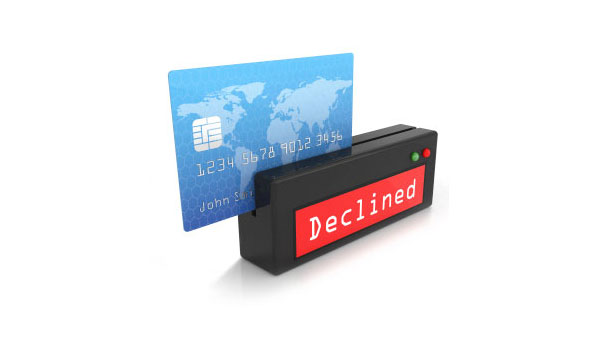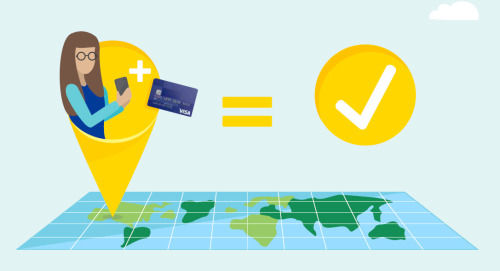Your bank (and by extension, your money) is 4,000 miles away in the States, and you’re in Europe. What could possibly go wrong?
Everything. And this is not one of those curated posts where I draw on other peoples’ misery. Noooo, I just spent a couple of days trying to survive in the Netherlands on 20 euros, because all my credit cards and my debit card were blocked. Well, that’s not entirely true … my American Express card worked fine. But guess which card no one takes in the Netherlands except U.S.-based hotel chains? (Where I survived on Cokes and Pringles from the mini bar.)
Even though I called every single credit card company before leaving the United States, every single credit card had been frozen for fraudulent activity after the first attempt to use it in Europe!
 My crime … I tried to pay my 2,200 euro rent on two MasterCards. Which is when I saw the message no traveler or expat ever wants to see: “Your bank has declined this transaction.” The consolation is this is happening to a lot of people, and the reason is credit card fraud. The banks, of course, have insurance if they have to cover fraud on your credit card. But that insurance is getting more expensive as fraud increases as crooks get more digitally astute.
My crime … I tried to pay my 2,200 euro rent on two MasterCards. Which is when I saw the message no traveler or expat ever wants to see: “Your bank has declined this transaction.” The consolation is this is happening to a lot of people, and the reason is credit card fraud. The banks, of course, have insurance if they have to cover fraud on your credit card. But that insurance is getting more expensive as fraud increases as crooks get more digitally astute.
So guess who gets caught in the middle … you, the consumer.
When I called CapitalOne to ask why my Quicksilver card wouldn’t accept my rent charge when our credit limit is $20,000, the customer service rep transferred me to a fraud investigator. When I explained what was going on, Robert the fraud guy promised to call me back. He never did. Then, my wife Cheryl got in touch with him from the States and asked him what was going on. His response: This is all YOUR fault.
Excuse me? We notified the card companies days in advance that I’d be making an extended business trip to the Netherlands and several other countries in Western Europe. (Only American Express, by the way, doesn’t’ require you to notify them of upcoming international travel.)
Anyway, Cheryl had Robert on the phone for 30 minutes, saying, “Look, we called you ahead of time. Then, we okayed the fraud alert email, and it still didn’t work.” Robert counters the fraud alert inquiries “are not the best system,” implying CapitalOne just ignored the fact we verified the rent charge was legitimate. “Well, that’s the system you presented to your customer,” Cheryl said. “This is not supposed to happen. If you say you have to call in before, that should be sufficient. And but to freeze an account even beyond those measures is not just stupid, it’s wrong. I had to get him a hotel for three days!”
We finally got our American Airlines Advantage card reactivated and completed the rent transaction. But CapitalOne’s obstinacy cost us about 175 euros, or about $200. We reached out to CapitalOne for their side of the story, because we’re guessing fraud is becoming a bigger issue. Media relations rep Amanda Landers immeadiately responded to our query and promised to “tag back with our Fraud team and look into what happened with your card being blocked.”
To her credit, Landers turned out to be a lot more responsive than Robert.
After consulting the CapitalOne fraud team, Landers found out her company sent an alert to Cheryl’s email and Cheryl responded within about three hours that the charge was legitimate. CapitalOne replied back that if purchase was declined, to try it again and there shouldn’t be a problem.
“This particular transaction (given the merchant and high dollar amount) was risky enough to trigger a decline despite the travel notification,” Landers wrote in an email. “This is all done in the interest of protecting the account from fraud.We strive to balance protecting customer accounts and avoiding disruptions in service.”
Still, declining our transaction didn’t cost CapitalOne anything except our good will, and they avoided the possibility of eating 2,200 eursos. Their risk exposure is zero when they refuse to accept transactions. If you think you can work around all this by using the credit card or debit card from your local bank, think again. Your local bank likely doesn’t have the asset base to process its own cards. They use a third-party credit card/debit card provider. And THEY get to cut you off.
Which is what happened with our bank in the United States, where we’ve banked for about 9 years. When I tried to get cash from ING, BNP Paribas and other bank ATMs, the message flashed up that I had exceeded my daily transaction limit (though I hadn’t any!) and they wouldn’t dispense the cash. I got that same message at each European bank.
However, those executives at Stock Yards Banks were incredibly responsive compared to Robert at CapitalOne. Yes, we know several of the top executives, and that never hurts. But SYB has a reputation for soundness and responsiveness. Which is why – despite our temporary woes – we opened another business account there moments after clearing the fraudulent alerts.
As an example of how far they went to help, here’s an excerpt from an email exchange. We’re not using the executive’s name because he’s not a media contact:
I’m going to forward your e-mail to the head of our Bankcard Dept. (xxxxx), the head of our entire Deposit Operations Dept. (xxxxx) and the head of our electronic banking department customer service center (xxxxx.) All three of these individuals have contacts with Fiserv. Fiserv is our core computer system provided (our mainframe) and they also manage all of our card processing.
The folks at the branch are more than likely talking to the folks I just mentioned above (xxxxx, xxxx or someone on their staffs). Those folks in turn are communicating with Fiserv. I’m pretty sure Fiserv is who actually controls your card usage ability when you’re away from home in the United States or are outside of the country.
The trouble is, Cheryl went to the bank in person to get the debit card unblocked, but without success until our friend weighed in. So I spent a couple of days surviving on those Cokes and Pringles. It took going to the top. A few minutes after we received the email, all systems were go with our SYB debit card.
We tried to talk to credit card experts about this whole issue, but no one was willing to go on the record. One told me via email, “Just look at the media reports and you’ll see what’s going on.”
I did search online, and data from the Financial Fraud Action UK show overseas fraud losses on UK cards is an increasing problem, up 14 percent in the first 6 months of 2015 alone.
British travelers in particular have problems with this, because they tend to travel internationally more than Americans, and British banks – RBS-NatWest, Barclays, Lloyds, HSBC – are all over the map on fraud policy. Some ask cardholders to notify them in advance about foreign travel, and some don’t. The advent of the chipped card should have solved all this, but the only company that seems to put the consumer first is American Express. Though of course, it’s difficult to find merchants who’ll take that card.
Amanda Landers did pass on this advice:
I would definitely consider highlighting email and text alerts with your readers and advising they double-check what is on file before traveling. This can be done through our credit card online servicing, as can the travel notification. Both email and text alerts enable customers to immediately clear a fraud concern by responding to the email or text we send when we suspect there is fraud. This allows the customer to continue using the credit card.
So, to Robert’s point, it was kind of our fault for not setting up text alert. That could have gotten our CapitalOne card unblocked almost instantly.
 The good news in all this is that fintech is coming to save the day. Finsphere, a Seattle-based fintech startup, is working with Visa. Visa Mobile Location Confirmation uses your smartphone to confirm where you are in the world and verify your location matches where their credit card is being used, according to a 2015 Geekwire post. Earlier this year, the Guardian had a post about similar technology in UK.
The good news in all this is that fintech is coming to save the day. Finsphere, a Seattle-based fintech startup, is working with Visa. Visa Mobile Location Confirmation uses your smartphone to confirm where you are in the world and verify your location matches where their credit card is being used, according to a 2015 Geekwire post. Earlier this year, the Guardian had a post about similar technology in UK.
Until that technology becomes widely available, my advice after all this is to increase your odds by taking several credit cards, and if you don’t have American Express, get it. I know … the fees are high, and merchants cringe when you pull it out.
But if worse comes to worse, you can find a restaurant and hotel that take it so you’ll have food and shelter until you can get those other cards unblocked. Also, American Express has created a prepaid, reloadable travel card for AAA that you can top up with your currency of choice, so no one can cut you off. (There’s some fine print, but it looks perfect for emergencies.) I always wanted to say this:
“American Express … don’t leave home without it.”
Co-CEO of Dispatches Europe. A former military reporter, I'm a serial expat who has lived in France, Turkey, Germany and the Netherlands.















